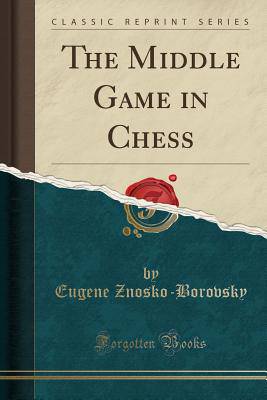
- Retrait gratuit dans votre magasin Club
- 7.000.000 titres dans notre catalogue
- Payer en toute sécurité
- Toujours un magasin près de chez vous
- Retrait gratuit dans votre magasin Club
- 7.000.000 titres dans notre catalogue
- Payer en toute sécurité
- Toujours un magasin près de chez vous
17,45 €
+ 34 points
Description
Excerpt from The Middle Game in Chess Such an abnormal state of affairs has induced me to occupy myself for a long time with the theoretical study Of the middle game. There was no question for me, IS such a study possible? Why, I should like to know, Should that question arise? TO me the study seemed not only very desirable, but also quite necessary. My only doubt was how to begin it and how best to carry it out. Everything had to be created. There was not even a classification, which is the basis of all science; and the mass Of raw material - the endless number of annotated games - alarmed me by its immensity. AS I pursued my study, I saw very clearly that the middle game in chess is chess itself. Chess is neither the ending, which may Often be reduced to a mere arithmetical calcula tion, nor the opening, which, starting from a constant set position, develops the forces by an involuntary following of beaten paths. The middle game, I repeat, is chess itself; chess, with all its possibilities, its attacks, defences, sacrifices, etc. If, therefore, there is a theory of the game, not as a conglomeration Of different variations, but as a system of general concrete realities based on objective facts, then the theory of the middle game will present no special difficulties. Up to now no such theory has existed. The discussions with regard to the middle game were still in the air. The theory which was right for one position might be quite wrong for another. Where could be found the basis of agreement, to compel assent? Thus I came to the conclusion that it was first of all necessary to study the game of chess in general, the game founded on objective facts. About the Publisher Forgotten Books publishes hundreds of thousands of rare and classic books. Find more at www.forgottenbooks.com This book is a reproduction of an important historical work. Forgotten Books uses state-of-the-art technology to digitally reconstruct the work, preserving the original format whilst repairing imperfections present in the aged copy. In rare cases, an imperfection in the original, such as a blemish or missing page, may be replicated in our edition. We do, however, repair the vast majority of imperfections successfully; any imperfections that remain are intentionally left to preserve the state of such historical works.
Spécifications
Parties prenantes
- Auteur(s) :
- Editeur:
Contenu
- Nombre de pages :
- 242
- Langue:
- Anglais
Caractéristiques
- EAN:
- 9781330020265
- Date de parution :
- 19-04-18
- Format:
- Livre broché
- Format numérique:
- Trade paperback (VS)
- Dimensions :
- 152 mm x 229 mm
- Poids :
- 326 g







